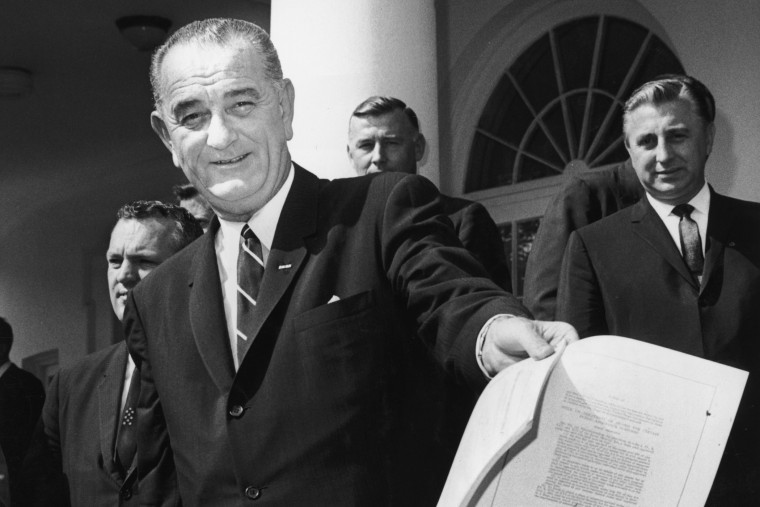Peter Baker makes the case today that Lyndon Johnson's legacy "looms large" over the Obama presidency -- two Democratic presidents with ambitious agendas, each eager to leave their mark on history with sweeping progressive successes.
Baker notes, however, that Johnson's "level of legislative success" -- the Civil Rights Act, the Voting Rights Act, Medicare, Medicaid, the Fair Housing Act, immigration, education, gun control, and the environment -- "represented the high-water mark" that Obama and his supporters can only reflect on with envy.
Two days before joining other presidents in Texas to commemorate the 50th anniversary of the Civil Rights Act, President Obama tackled enduring inequality himself on Tuesday, in this case economic disparity based on gender. His action? Signing an executive order barring federal contractors from retaliating against employees who discuss their pay and a memo seeking statistics on contractor salaries. If the photo-friendly ceremony in the East Room was not exactly the stuff of Mount Rushmore, it did reflect a broader question about the state of the presidency a half-century after Lyndon B. Johnson enacted monumental change in American society: Is it even possible for a president to do big things anymore?
The article added that the Obama presidency has "become a symbol of liberal frustration over his inability to use government to bring about change."
I can appreciate where analyses like these come from, but I also continue to believe the "can presidents still do big things" question reflects a misunderstanding about institutional limits under the American system.
Consider a brief stroll down memory lane. In 2009 and 2010, there was a Democratic president working with large Democratic majorities in the House and Senate. Though for 20 of the 24 months, Republican filibusters were able to block all kinds of worthwhile measures, Obama was able to sign health care reform, an economic package that ended the Great Recession, Wall Street reform, a sweeping overhaul of the student-loan system, DADT repeal, the new START treaty, and improved food safety, consumer protections, and national-service opportunities.
It was as productive a two-year period for federal policymakers since, well, Lyndon Johnson.
And since then, the list of breakthrough legislative accomplishments has dwindled to effectively zero.
Now, there are those who may try to argue that the president somehow forgot how to get things done in early 2011, after racking up historic breakthroughs in 2009 and 2010, but it's more likely that Obama would have signed more "legislative successes" in the last few years if he were able to work with a legislative branch filled with legislators prepared to legislate.
The Beltway and much of the political media resist this, often fiercely. The public routinely hears from pundits -- Ron Fournier comes to mind, but he's hardly the only one -- who argue that President Obama could still achieve legislative breakthroughs if only he tried to "lead more." If Obama persuaded radicalized Republican lawmakers who hold him in blinding contempt to cooperate with him through the power of persuasiveness, the argument goes, then this president could still have an LBJ-like list of accomplishments.
It's tiresome because the assumptions are based on an exaggerated sense of presidential power. Those who sit in the Oval Office have great influence over policymaking, but they can't force lawmakers, especially extremist lawmakers from the other party, to do their bidding through sheer force of will.
Indeed, those who wonder why Obama can't be more like Johnson often forget what Johnson saw on Capitol Hill. The 89th Congress, which governed in 1965 and 1966, approved Medicare, Medicaid, the Voting Rights Act, Higher Education Act, and the Freedom of Information Act, among other things. Was it because LBJ was such a persuasive guy who believed in "leading more"? Maybe, or perhaps it was because Johnson's party enjoyed overwhelming supermajorities in the House and Senate, and governed in an era in which filibusters were extremely rare (as opposed to being imposed on literally every piece of important legislation).
Obama's legislative victories from his first two years were so impressive, he already has more breakthrough accomplishments on his record than most modern presidents. History will likely be kind. But those who remain "frustrated" he hasn't been able to do more should direct their attention to the other end of Pennsylvania Avenue.
